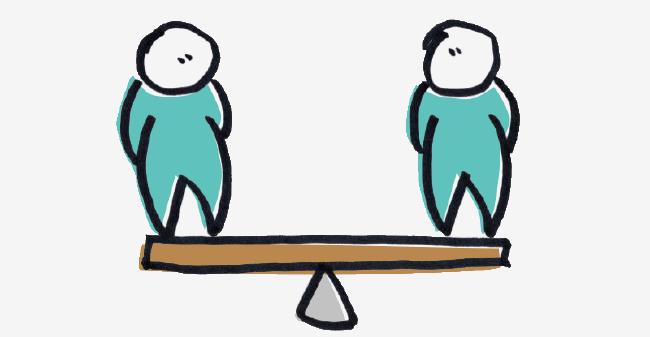Categories
Connected or Tech-Zombies? What will COVID-19's legacy be?
5 minute read
Hello giffgaff members. I’m Jon Barnes and I was invited by giffgaff to write about our relationship with technology particularly related to our mental health during the pandemic.
For years I’ve been suggesting that we need to be careful about the degree to which much of the technology we use is designed to be addictive and manipulative. The average person picks up their phone about 200 times per day and uses screens 3 hours per day. According to Time To Log Off, "There is a strong link between heavy internet use and depression, with heavy users 5x more likely to suffer from depression than non-heavy users”.
And now, the world’s got really weird. We’re in this strange phase in history where we really don’t have much choice. We’re stuck at home, doing work video calls still wearing pyjama bottoms. We’re away from our colleagues, friends, communities, families, the internet is our social life now. I saw a cute meme online the other day, somebody suggested that we should call it ‘spatial distancing’ because we actually need ‘social strengthening’ right now. I couldn’t agree more.
The need for balance
Technology is often compared to addiction. This is because it has been highlighted that many of the big tech platforms actually studied slot machines to create addictive mechanics. They describe their strategies for getting us to use their software as a ‘Hook cycle’ because the goal is explicit: to get us hooked.
But this drug is different. Gambling isn’t useful. Technology is. It’s not difficult to argue that somebody should totally stop gambling, but it is difficult to argue we should totally stop using technology. I need technology, I really do. I need it to work from home, to earn my living. I need it to have video calls with my grandma because seeing her right now would be a huge risk to her. I need it to tap into the collective consciousness and the swaths of both support and humour that society is amassing as a reaction to hardship. So I can’t stop technology and I really don’t want to.
Now is a time to find balance. Two days ago I didn’t sleep, I went to bed with a headache and it stayed with me all night. No surprise, I’d spent 5 hours on video calls that day, had checked my phone over a couple of hundred times, was multitasking between a gazillion tabs and watched some TV with my son. That isn’t balanced. I was a puppet to the algorithm.
Yesterday was different. I stopped work slightly earlier, turned my phone off at 8pm and read a paper book for the rest of the evening. I slept like a dream. This morning I homeschooled my son, now I’ve come to my laptop having avoided screens for most of the morning and I’m on a roll, feeling mega productive. This is better. I’m back in control.

5 Tips for balanced tech behaviour
This pandemic plays into a dangerous cycle. We have never needed this addictively designed technology more than we do now. And so this is not a time for tee-totalling on technology, but neither is it the time to plug into the matrix or in months we’ll awake to actually find that we’ve become zombies. So how to find the balance? Here are some tips:
-
Think ‘close to home’. Are you connecting with the people you really care about? Use your device to call your family and reconnect with the people you love. This is a great thing to come from this. If you’re just cruising Twitter all day, perhaps that’s not really social…
-
Look to the people around you. You might be spending all day with your family or kids now. Use it as an opportunity. You might not get connected with them so much for a long time. Put the screen down and talk, hug, build something out of lego together. One way of doing this is to ask yourself: is tech connecting me to others right now (e.g. distant family) or disconnecting me from others right now (e.g. the people you’re sharing your home with).
-
Make time for Deep work. At the end of my long day of calls the other, my brain was fizzing with dopamine. And I asked myself: “What did I get done today?” The answer was a resounding “Nothing”. So make time to close your email, turn off notifications and do some deeper work. The world can wait a few hours. You’re not that important.
-
Think of the other side. In my experience when I overuse technology, I find my thinking speeds up, becomes a bit frantic and I realise I’m thinking short term all the time. The next day, the next email… This lockdown is perhaps a chance to rebuild what you want to come out the other side. A new career? A new hobby? A book you wanted to write? A more balanced family life? A workout habit? Take some time to journal and ask yourself this. Perhaps it’s time for a rest.
-
Look after yourself. The connection between tech and poor mental health is particularly worrying when we’re locked inside during a global health epidemic. What we need is for our minds to stay balanced so that we can look after ourselves, our loved ones and be supportive. So use this time to journal, develop a meditation practice, do more yoga, whatever your thing is, your mind is all you have. And other’s need you to be healthy too. I find it motivating to tell myself that I need to keep a healthy mind, not for me, but for those I love.
And so perhaps this is an opportunity for us to reclaim our relationship with technology. To both unhook ourselves from its addictive pull whilst remembering that the internet has always had the potential to be the most beautiful prosocial thing we’ve ever had. To achieve that, we must find balance in the way we use it. As much for ourselves as for others.
I hope you enjoyed the read. If you have any question or if would like to know more about the work I do, please, visit http://jonbarnes.me/services.




